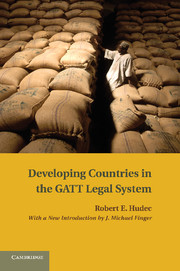Book contents
- Frontmatter
- Contents
- Foreword by Hugh Corbet
- Acknowledgments
- DEVELOPING COUNTRIES IN THE GATT LEGAL SYSTEM
- Introduction to the New Edition
- PART I A HISTORY OF THE LEGAL RELATIONSHIP
- PART II A LEGAL CRITIQUE OF THE GATT'S CURRENT POLICY
- 7 Basic Elements of the Legal Criticism
- 8 Separating Legal and Economic Issues
- 9 Impact of GATT Legal Policy on Internal Decision-making
- 10 Impact on Decisions in Other Governments: Non-reciprocity
- 11 Impact on Decisions in Other Governments: Preferences
- 12 First Steps Towards a Better Legal Policy
- List of References
- Index
8 - Separating Legal and Economic Issues
Published online by Cambridge University Press: 03 May 2011
- Frontmatter
- Contents
- Foreword by Hugh Corbet
- Acknowledgments
- DEVELOPING COUNTRIES IN THE GATT LEGAL SYSTEM
- Introduction to the New Edition
- PART I A HISTORY OF THE LEGAL RELATIONSHIP
- PART II A LEGAL CRITIQUE OF THE GATT'S CURRENT POLICY
- 7 Basic Elements of the Legal Criticism
- 8 Separating Legal and Economic Issues
- 9 Impact of GATT Legal Policy on Internal Decision-making
- 10 Impact on Decisions in Other Governments: Non-reciprocity
- 11 Impact on Decisions in Other Governments: Preferences
- 12 First Steps Towards a Better Legal Policy
- List of References
- Index
Summary
SEPARATING legal and economic issues is difficult because the two sets of issues tend to occupy the same ground. In the GATT, legal measures are never taken for their own sake. They are taken to encourage a particular kind of conduct because that conduct is thought to be economically beneficial. For a legal measure to be “effective”, it must have two consequences. It must induce the kind of conduct desired (legal effectiveness) and the desired conduct must in turn achieve the economic benefit desired (economic effectiveness). Debates over “effectiveness” have a tendency to slide from one issue to the other, usually without warning.
Neither issue is necessarily controlling when it comes to selecting the optimal government policy. Even if the government of a developing country is persuaded that certain market distortions are economically harmful and ought not to be employed, considerations of legal policy might still militate against undertaking GATT legal obligations prohibiting such distortions. For example, the government might believe (i) that it was perfectly capable of adopting liberal trade policies by itself without the aid of GATT obligations and (ii) that GATT obligations may cause political hardships for developing countries by legitimizing the use of economic coercion by developed countries. Alternatively, even if a government believed that certain market distortions were economically beneficial, it could still logically oppose adopting them on the grounds of legal policy.
- Type
- Chapter
- Information
- Developing Countries in the GATT Legal System , pp. 123 - 138Publisher: Cambridge University PressPrint publication year: 2010



